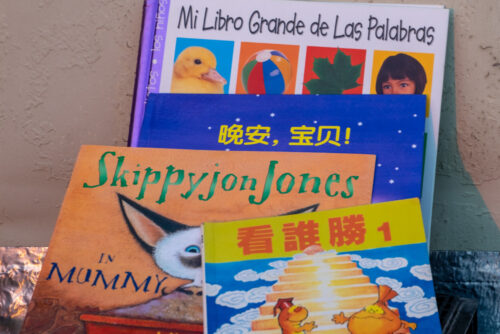Immigrants should teach their children their native language
By Eleni Balakrishnan
If you are an immigrant from a non-English-speaking country and you do not make the effort to pass along your native language to your children, you are doing everyone—from your child to the entire global economy—a terrible disservice. Make the small effort to speak to your children in your native tongue from the day they are born; everyone will thank you later.
To the parents who worry their kids won’t know English or will do poorly in school: science has shown time and time again that young children are able to pick up new languages easily. You may have had some trouble learning English when you first moved to the U.S., and you may still struggle with grammar and certain pronunciations. But your child (especially if they are here from a young age) will eventually go to school and speak fluent and “accent-free” English. Have you ever met a person who spent their entire childhood somewhere without speaking the language? No, I didn’t think so.

The fact that your child will be smarter if they speak more than one language is practically a given fact at this point. Research has been done showing that multilinguals have increased brain matter in the anterior cingulate cortex (ACC), a part of the brain that helps monitor actions and is part of the attentional and executive control system. In other words, speaking more than one language helps your brain controls and strengthens your attention capabilities. Teaching your kid your native language is one of the easiest ways to guarantee these benefits for your child.
Furthermore, you can allow your child the option to connect with another society, which will add value to their life later on. Making your mother’s recipe and visiting your hometown every few years won’t cut it if your child can’t talk with the people! Even if you came here to escape horrible conditions in your homeland and don’t plan to go back, things can always change. By teaching your child your native tongue, you are keeping your culture, the rest of your family, and even the possibility of returning to the motherland within reach for your child.
Maybe you brought your child to the land of hope and opportunity and the American dream, and you don’t want them to go back to your home country. But keep in mind: your motherland might end up rising in the world, or becoming a center for U.S. business development. Your child can participate in your country’s growing economy, or they can work for a big American drilling company and take advantage of them! While I prefer the former, both options will be far more effective if your kid speaks the language well.
More realistically, in an increasingly multilingual world — the majority of the world currently speaks more than one language — where the great United States of America and its “Speak English!” tendencies may not lead the world forever, it’s a good idea to maximize possible connections with other countries. Especially if you speak a major world language like Mandarin or Spanish, your child’s bilingualism will make them functional in areas outside of the United States.
Finally, if you love your native land and wish you could have stayed, share this love with your child. While the obvious language giants are huge competitors to English on the international scene, other languages are slowly dying out. Your homeland and its shrinking population will thank you for speaking to your child in your native language, even if the only outcome is increased awareness. Do what you can to keep your beloved culture alive.
Raising a child is difficult. And while there are many difficult decisions that must be made in the process, whether or not to pass along your lingual heritage shouldn’t be one of them. Fight homogenization and help keep this country diverse and colorful and interesting. In the process, help your child get a leg up in life: socially, intellectually, financially. They will not learn the language later—it’s up to you, now.
